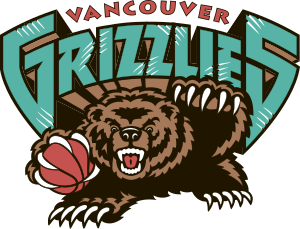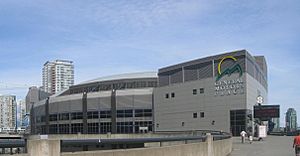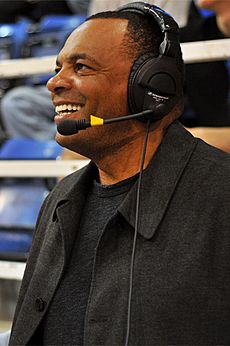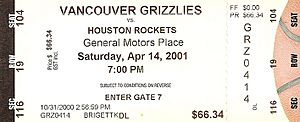Vancouver Grizzlies facts for kids
Quick facts for kids Vancouver Grizzlies |
|||
|---|---|---|---|
 |
|||
| Conference | Western | ||
| Division | Midwest | ||
| Founded | 1995 | ||
| History | Vancouver Grizzlies 1995–2001 Memphis Grizzlies 2001–present |
||
| Arena | General Motors Place | ||
| Location | Vancouver, British Columbia | ||
| Team colors | Turquoise, bronze, red, black |
||
| General manager | Stu Jackson (1994–2000) Billy Knight (2000–2001) |
||
| Head coach | Brian Winters (1995–1997) Stu Jackson (1997) Brian Hill (1997–1999) Lionel Hollins (1999–2000) Sidney Lowe (2000–2001) |
||
| Ownership | Orca Bay Sports and Entertainment (1995–2000) Michael Heisley (2000–2001) |
||
| Championships | 0 | ||
| Conference titles | 0 | ||
| Division titles | 0 | ||
|
|||
The Vancouver Grizzlies were a professional basketball team from Vancouver, Canada. They played in the National Basketball Association (NBA) as part of the Western Conference's Midwest Division. The team started in 1995, at the same time as the Toronto Raptors, when the NBA expanded into Canada.
After the 2000–01 season, the team moved to Memphis, Tennessee, in the United States. They were then renamed the Memphis Grizzlies. The Vancouver Grizzlies played all their home games at General Motors Place, which is now called Rogers Arena.
Like many new teams, the Grizzlies had a tough start. They finished last in their division in almost every season. They never won more than 30% of their games while in Vancouver. In total, they won 101 games and lost 359. They never made it to the NBA playoffs.
The NBA's rules at the time made it harder for new teams to get top players. However, the Grizzlies still drafted talented players like Shareef Abdur-Rahim in 1996 and Mike Bibby in 1998. Even with these players, the team kept losing. In 1999, they drafted Steve Francis, but he refused to play in Vancouver and was traded away.
After a player strike in 1998–99, fewer fans came to games. Also, the Canadian dollar was weak, which caused the team's owner, Orca Bay Sports and Entertainment, to lose money. After a plan to sell the team to Bill Laurie failed, it was sold to Michael Heisley. The team then moved to Memphis for the 2001–02 season.
Contents
Team History
How the Team Started
Before the Grizzlies, the only other professional basketball team in Canada was the Toronto Huskies, who played just one season in 1946–47. In the 1980s, a businessman named Nelson Skalbania tried to bring an NBA team to Vancouver, but it didn't work out.
Then, Arthur Griffiths, who owned the Vancouver Canucks hockey team, announced in February 1993 that he wanted an NBA team for Vancouver. Griffiths was building a new 20,000-seat arena in downtown Vancouver for the Canucks, which was set to open for the 1995–96 season.
The Toronto Raptors were given an expansion team for that season on September 30, 1993. On February 14, 1994, the NBA gave Vancouver a first approval. The final approval came on April 27. Both new teams paid a fee of US$125 million to join the league. The Grizzlies became the NBA's 29th team.
One challenge was that the NBA wanted British Columbia to stop betting on Grizzlies games. This betting, called Sports Actions, brought in money for provincial health care. The issue was solved on February 9, 1994, when the team's company agreed to donate $500,000 each year to health care.
On July 22, the team hired Stu Jackson as their general manager. He had been a coach for college and NBA teams before. The team was first going to be called the Vancouver Mounties, but the Royal Canadian Mounted Police objected. So, on August 11, the team announced its new name: the Grizzlies, named after the bears found in British Columbia. Their colors were turquoise, bronze, and red.
The Vancouver Grizzlies were the first NBA team to have their own website, which was created in 1995.
To start playing, the team needed to sell 12,500 season tickets by January 1, 1995. This was a high number. On December 21, 1994, only about 10,000 tickets were sold. Then, a company called Shoppers Drug Mart bought the remaining 2,500 tickets, helping the team reach its goal.
On March 7, 1995, Arthur Griffiths sold most of his ownership in the team to Seattle-based John McCaw, Jr.. Griffiths and McCaw created a new company called Orca Bay Sports and Entertainment. This company owned the Canucks, the Grizzlies, and the General Motors Place arena. On June 19, Brian Winters was named the head coach. He had been an assistant coach for nine seasons. The team's first player was Kevin Pritchard, who signed as a free agent.
Five days later, the Grizzlies and Raptors took part in the 1995 NBA expansion draft. Each of the 27 NBA teams could protect eight of their players. The two new teams could pick one unprotected player from each team. Vancouver won a coin flip and chose to get a better pick in the main draft, letting the Raptors pick first in the expansion draft. Vancouver's first pick was point guard Greg Anthony. Other players they picked included Byron Scott and Gerald Wilkins.
The NBA made a rule that hurt both Canadian teams: they couldn't get a top-five pick in the draft for their first four seasons, even if they had the worst record. They also couldn't spend their full salary cap for the first two seasons. In the first draft, the Grizzlies picked sixth and chose center Bryant Reeves. He was a good player, but he wasn't exciting enough to draw in many fans.
Six Seasons in Vancouver
Every year, except for the 1998–99 season, the Grizzlies played the Raptors in a pre-season game called the Naismith Cup. This game was held in different cities across Canada.
The Grizzlies' first official game was against the Portland Trail Blazers. They won that game and their next game against the Timberwolves. However, after that, they lost 19 games in a row. Later, they set an NBA record by losing 23 games straight from February to April. The season ended with only 15 wins and 67 losses, which was the worst record in the league. About 17,183 fans came to their games on average, ranking 14th in the NBA.
Shareef Abdur-Rahim was picked third overall by the Grizzlies in the 1996 NBA draft. He quickly became the team's best scorer, averaging 18.7 points per game (ppg). He was a top candidate for the NBA Rookie of the Year award. Despite his efforts, Brian Winters was replaced as head coach after 43 games in the 1996–97 season by Stu Jackson. The Grizzlies won only 14 games that season, again the worst in the league.
For the 1997–98 season, Brian Hill became the head coach. In the draft, Vancouver picked Antonio Daniels fourth. The team won 19 games, finishing sixth in their division, ahead of the Denver Nuggets.
Before the 1998–99 Vancouver Grizzlies season, the Grizzlies signed Cherokee Parks. They also traded Daniels for other players. In the draft, the Grizzlies picked Mike Bibby second overall. During the 1998–99 season, Abdur-Rahim played even better, averaging 23.0 ppg, his best season ever. Because of a player strike, the season was shorter, with only 50 games. Even though the team finished with only 8 wins and 42 losses, their lowest winning percentage ever, more fans actually came to their games that season.
The Grizzlies had the second pick again in the 1999 draft. Even though they had a great point guard in Mike Bibby, they picked Steve Francis. Francis had hoped to be picked by the Chicago Bulls and didn't want to play in Vancouver. After an incident at the airport, his agent tried to get him traded. In a huge deal involving eleven players and three teams, Francis was sent to Houston. The Grizzlies received several players and draft picks. Francis went on to win the Rookie of the Year Award. Fans in Vancouver often booed him when he played there.
In the 1999–2000 season, Lionel Hollins took over as coach after 22 games. The season ended with 22 wins and 60 losses, putting the Grizzlies last in their division. Fan attendance dropped a lot that season, averaging 13,899, which was the third lowest in the league. Hollins was replaced as head coach after the season. He later coached the Grizzlies two more times after they moved to Memphis.
For the 2000–01 season, their last in Vancouver, Sidney Lowe was hired as head coach. Stromile Swift was picked second overall in the draft. The team had their best record in Vancouver with 23 wins and 59 losses, but still finished last in the division. The Grizzlies' last home game at GM Place was against the Rockets on April 14, 2001. Their final game as the Vancouver Grizzlies was a 95–81 win against the Golden State Warriors on April 18, 2001.
Moving to Memphis
The player strike in 1998 was a big turning point for the team's money problems. Attendance dropped from 16,108 fans per game in 1997–98 to 13,899 in 1999–2000. This was the third-lowest attendance in the league. The team's owner, Orca Bay, started losing money, partly because the Canadian dollar was weak.
In September 1999, John McCaw, Jr. announced he would sell the Grizzlies to Bill Laurie, who owned the St. Louis Blues hockey team. Laurie said he wanted to move the Grizzlies to St. Louis, but the NBA stopped the sale.
Instead, McCaw sold the team to Michael Heisley for US$160 million. At first, Heisley said he would keep the team in Vancouver. But he soon started looking for a new city in the US. Many cities were considered, including Memphis, Nashville, Las Vegas, and New Orleans.
Even though a new arena needed to be built, Memphis was chosen as the new city on March 26, 2001. The NBA officially approved the move on July 3, 2001.
The last player who played for the Vancouver Grizzlies and then for the Memphis Grizzlies was Stromile Swift. He last played for Memphis in the 2007–08 season. The very last active Vancouver Grizzlies player in the NBA was Mike Bibby, who retired after playing for the New York Knicks in the 2011–12 season.
Team Uniforms
The Vancouver Grizzlies' first uniforms had designs inspired by Indigenous art and red details. Their home uniforms were white with turquoise letters and black and bronze trim. The road uniforms were turquoise with white letters and black and bronze trim. The front of the uniform showed the full team name. A "howling bear" logo was on the left leg, and a "ball and claws" logo was on the belt.
In the 1997–98 season, the Grizzlies added a black alternate uniform. This uniform only had the city name on the front and thick turquoise and thin red stripes. The letters were white with red and turquoise trim. A different "G-bear" logo was on the right leg, and a "paw" logo was on the belt. This black uniform became the main road uniform for the 2000–01 season. They also introduced a matching white uniform with black letters and red and turquoise trim.
The current Memphis Grizzlies team has brought back both of the original Vancouver Grizzlies uniforms. They wore the turquoise one in the 2019–20 season and plan to wear the white one in the 2024–25 season. This is to celebrate the Grizzlies franchise's 25th and 30th anniversaries.
Home Arena
General Motors Place was the home arena for the Vancouver Grizzlies for all their games before they moved to Memphis. This arena is now known as Rogers Arena.

Season Records
While in Vancouver, the Grizzlies played in the Midwest Division of the Western Conference.
| Season | Regular season | Playoffs | Attendance | Ref | ||||
|---|---|---|---|---|---|---|---|---|
| Pos | GP | W | L | Win% | ||||
| 1995–96 | 7th | 82 | 15 | 67 | .183 | — | 17,183 | |
| 1996–97 | 7th | 82 | 14 | 68 | .171 | — | 16,571 | |
| 1997–98 | 6th | 82 | 19 | 63 | .232 | — | 16,108 | |
| 1998–99 | 7th | 50 | 8 | 42 | .160 | — | 16,718 | |
| 1999–00 | 7th | 82 | 22 | 60 | .268 | — | 13,899 | |
| 2000–01 | 7th | 82 | 23 | 59 | .280 | — | 13,737 | |
Head Coaches

Five different people were head coaches for the Vancouver Grizzlies. Here is a list of their coaches while the team was in Vancouver:
| # | Name | Term | Games Coached | Wins | Losses | Win Percentage | Ref |
|---|---|---|---|---|---|---|---|
| 1 | Brian Winters | 1995–1997 | 184 | 36 | 148 | .196 | |
| 2 | Stu Jackson | 1997 | 39 | 6 | 33 | .154 | |
| 3 | Brian Hill | 1997–1999 | 154 | 31 | 123 | .201 | |
| 4 | Lionel Hollins | 1999–2000 | 60 | 18 | 42 | .300 | |
| 5 | Sidney Lowe | 2000–2001 | 82 | 23 | 59 | .280 |
Cultural Impact
The Vancouver Grizzlies team has been featured in two documentary films by Vancouver filmmaker Kathleen Jayme. These films are called Finding Big Country (released in 2018) and The Grizzlie Truth (released in 2022).
 | Precious Adams |
 | Lauren Anderson |
 | Janet Collins |


